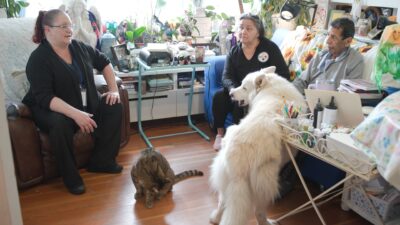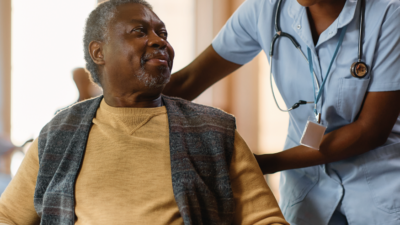Everyone’s life is different. Death is an individual experience, too.
For some people, the dying process may last weeks. For others, it may last a few days or hours. A dying person’s experience may be influenced by their illness or medications, but certain signs and symptoms are common.
Patients who begin hospice care earlier in their illness may not experience any symptoms for many months. But as death approaches, you may notice some of these changes.
Communication and activity levels decrease
Talking and physical activity decrease significantly. Your loved one may sleep for long periods of time and resist movement of any kind.
What you can do: Gentle turning and repositioning can ease muscle stiffness and pressure injuries to the skin. If your loved one expresses discomfort or you see signs of pain (such as grimacing) with movement, talk with the hospice team about how to safely reposition around the person’s pain management schedule or how to add pain medication as needed.
Appetite declines
Interest in eating and drinking decreases or stops altogether. This is normal and expected as your loved one’s physical systems slow down. Problems with swallowing can cause choking or coughing with any attempt to ingest medication, food or fluids.
What you can do: Never push food or fluids. Provide comfort care by maintaining good oral hygiene, keeping your loved one’s mouth and lips moist with damp sponges, and applying lip balm to prevent chapping. The hospice team can prescribe medications that are absorbed under the tongue, through the skin or by injection to provide rapid symptom relief.
Bowel and bladder function changes
Constipation may become more evident as your loved one’s appetite for food and fluid lessens. A loss of bladder control and functioning also may occur.
What you can do: Stool softeners or laxatives may be needed to maintain comfort.
If incontinence is causing skin discomfort, or if your healthcare provider suspects urine is being retained, a Foley catheter may be recommended to drain urine from the bladder. The catheter is painless when in place. It will help to protect your loved one’s skin, ease pain and pressure from urinary retention, and minimize the need to turn or reposition your loved one for diaper or pad changes.
Body temperature changes
Your loved one’s body temperature may drop by a degree or more. Other people may develop a mild fever; their torso and face may appear flushed and feel warmer.
What you can do: A soft, warm blanket may be comforting if your loved one feels cold. Avoid using a heating pad to warm hands or feet; thin, fragile skin burns easily. If your loved one feels warm, place a lukewarm washcloth on their forehead to provide some relief.
Vital signs become irregular
Near the end of life, vital signs such as blood pressure and heart rate may fluctuate or gradually decrease.
What you can do: Report these changes to the hospice nurse or other healthcare provider. These symptoms can appear at any time as your loved one’s disease progresses, but they may become more pronounced in the final days or hours before death.
Skin changes
Skin may become purplish, pale, gray, or blotchy, especially on the knees, feet, buttocks, ears and hands. This is often a sign that death will occur within days or hours. Although pressure wounds can develop at any stage of a terminal illness, open wounds may appear rapidly at the end of life as the skin, like other organs, begins to stop functioning.
What you can do: Talk to the hospice team about care for wounds and other skin changes. This may not be the time for aggressive (and possibly painful) treatment. The goal is to ease pain, perhaps with medication, to keep the wound(s) from worsening if possible, and to keep your loved one’s skin clean and free from infection.
Pain intensifies
Pain may increase as the disease progresses, chronic conditions such as arthritis or stiff/inflamed joints worsen, or pressure injuries to the skin increase.
What you can do: Talk with the hospice team about pain management if your loved one tells you they are in pain; for people who are non-verbal, alert the hospice team to signs of discomfort such as agitation or restlessness, moaning or groaning, resisting movement by stiffening the body, grimacing, clenching fists or teeth, or calling out.
Changes in breathing
Breathing rate gradually slows
Near the end of life, breathing (respiration) may become irregular. Your loved one may have periods of rapid breathing or stop breathing for a short time. Coughing, noisy breaths, and shallow breathing are common in the final hours or days of life.
What you can do: Although this breathing can be distressing for caregivers, it does not indicate pain or suffering. Turning, repositioning, or elevating your loved one’s head and shoulders may ease noisy breathing, especially if they are having difficulty swallowing and excess secretions are being retained in the mouth. The hospice team may recommend medications that can help to manage these secretions.
Breathing takes on a new pattern
When death is near, breathing changes to a new pattern. Instead of a normal rate and rhythm, you may notice several rapid breaths followed by a period of no breathing, called “apnea.” Eventually, apnea increases from just a few seconds to longer periods with no breathing.
What you can do: Understand that this change to Cheyne-Stokes breathing, named for the person who first described it, usually means that death is minutes or hours away.
Cognitive changes
Interest in surrounding fades
A dying person may withdraw, bit by bit, from life — a process described as “detaching.” Your loved one may not respond to questions, show interest in their favorite activities, or interact with family members, caregivers or friends.
What you can do: Always act as if your loved one can hear you and is aware of what is going on. Hearing is one of the last senses to lapse before death. Keep the environment as calm and peaceful as possible by dimming lights, softly playing the person’s favorite music, and using soothing words and a gentle touch.
Agitation and restlessness appear
Your loved one may become restless or agitated for no apparent reason. This is known medically as “terminal restlessness” or “terminal agitation.”
What you can do: Talk to the hospice team, who can help with medication to ease the symptoms. Understand that these periods of disquiet are common near the end of life.
Sensory changes cause misperceptions
A dying person may experience sensory changes that cause them to misperceive the world around them. These misperceptions may be comforting or troubling, depending on their content.
- Illusions: Your loved one may hear the wind blowing but think the sound is someone crying; they may see a lamp in the corner of the room but believe it’s a person standing there.
- Hallucinations: The person may report hearing, seeing, or feeling things that others cannot perceive.
- Delusions: The person may be fearful that others are trying to harm them or believe they can accomplish impossible things.
- Near death awareness: Your loved one may tell you they will die soon or say they soon will be able to see God, another religious figure, or beloved family members and friends who have preceded them in death. They may talk about taking a trip or activities related to travel, such as packing a suitcase or getting on a plane.
What you can do: Understand that these sensory changes may come and go throughout the day, often becoming more pronounced at night. The dying person may take comfort in the thought of reuniting with deceased family members and friends. If sensory changes appear to be causing distress, the hospice team may recommend medications that can help.
Consciousness fades
Before death, many people become completely unresponsive. In this deeply unconscious or coma-like state, they cannot be roused, will not open their eyes, and are unable to communicate or respond to touch.
What you can do: Continue to speak gently to your loved one and tend to their needs. People in this state may still hear what is said, even if they no longer respond. They may still have the ability to feel pain or distress, even if they can no longer verbalize those feelings.
* This summary, originally written for HFA by William Lamers, M.D., has been revised and updated several times, most recently in 2024 by Angela Novas, MSN, RN, CRNP, ACHPN, hospice and palliative care consultant for HFA.



